Investigating Health and Social Care Services for Individuals
VerifiedAdded on 2021/02/19
|12
|3958
|188
Report
AI Summary
This report provides a comprehensive analysis of health and social care services, focusing on the integration of care for individuals. It explores local resources, unmet needs, and the role of healthcare practitioners in person-centered care. The report delves into supporting individuals in identifying their care needs, emphasizing principles of mental capacity and self-directed support. It further examines appropriate leadership styles for promoting effective inter-professional and multi-disciplinary team working, along with the responsibilities of data sharing. Various communication methods are discussed to review and meet the care needs of individuals, and strategies for identifying and responding to the needs of diverse service users are also included. The report offers insights into the provision of healthcare services in the UK, including a case study of an individual with vascular dementia, high blood pressure, and left-side weakness.
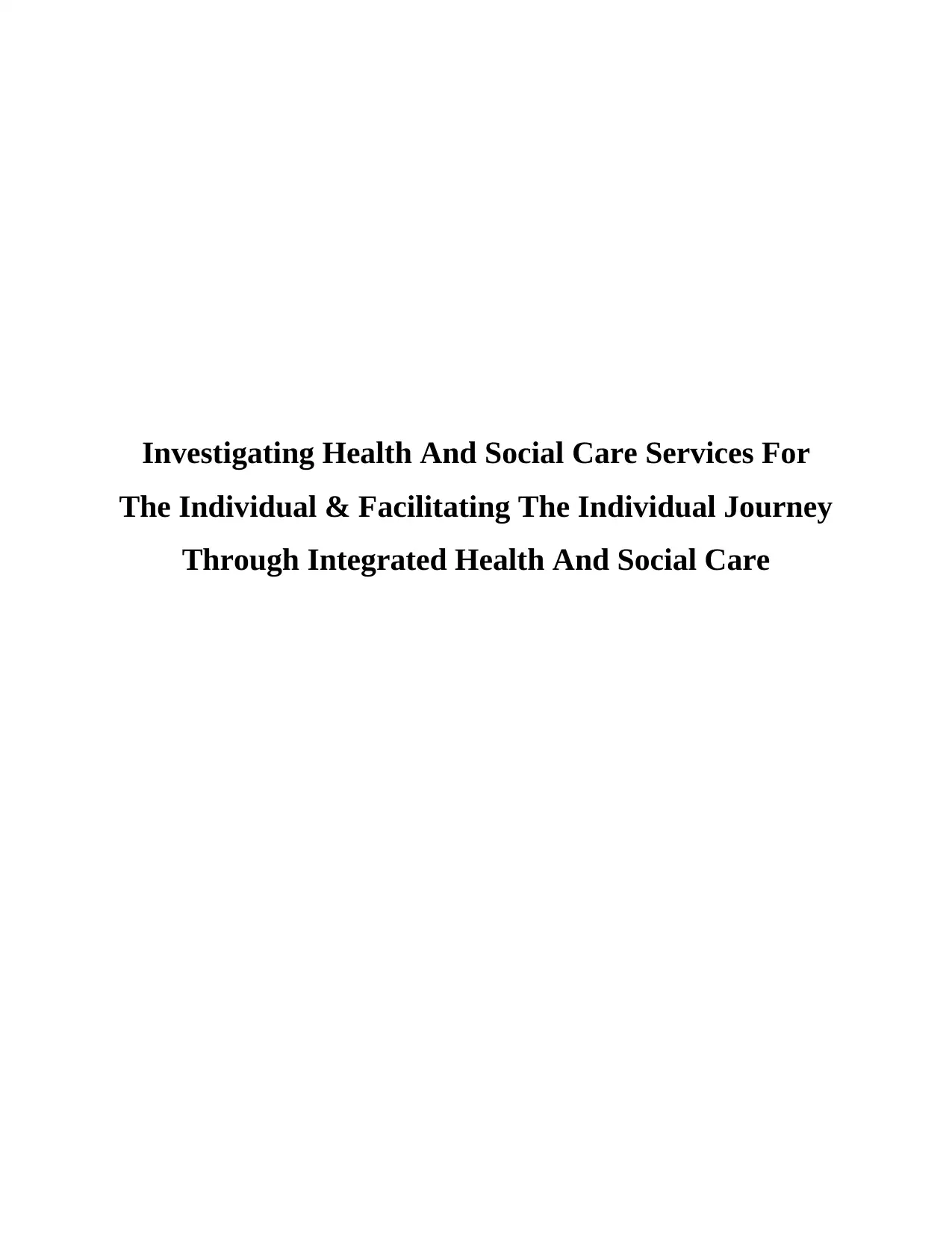
Investigating Health And Social Care Services For
The Individual & Facilitating The Individual Journey
Through Integrated Health And Social Care
The Individual & Facilitating The Individual Journey
Through Integrated Health And Social Care
Paraphrase This Document
Need a fresh take? Get an instant paraphrase of this document with our AI Paraphraser
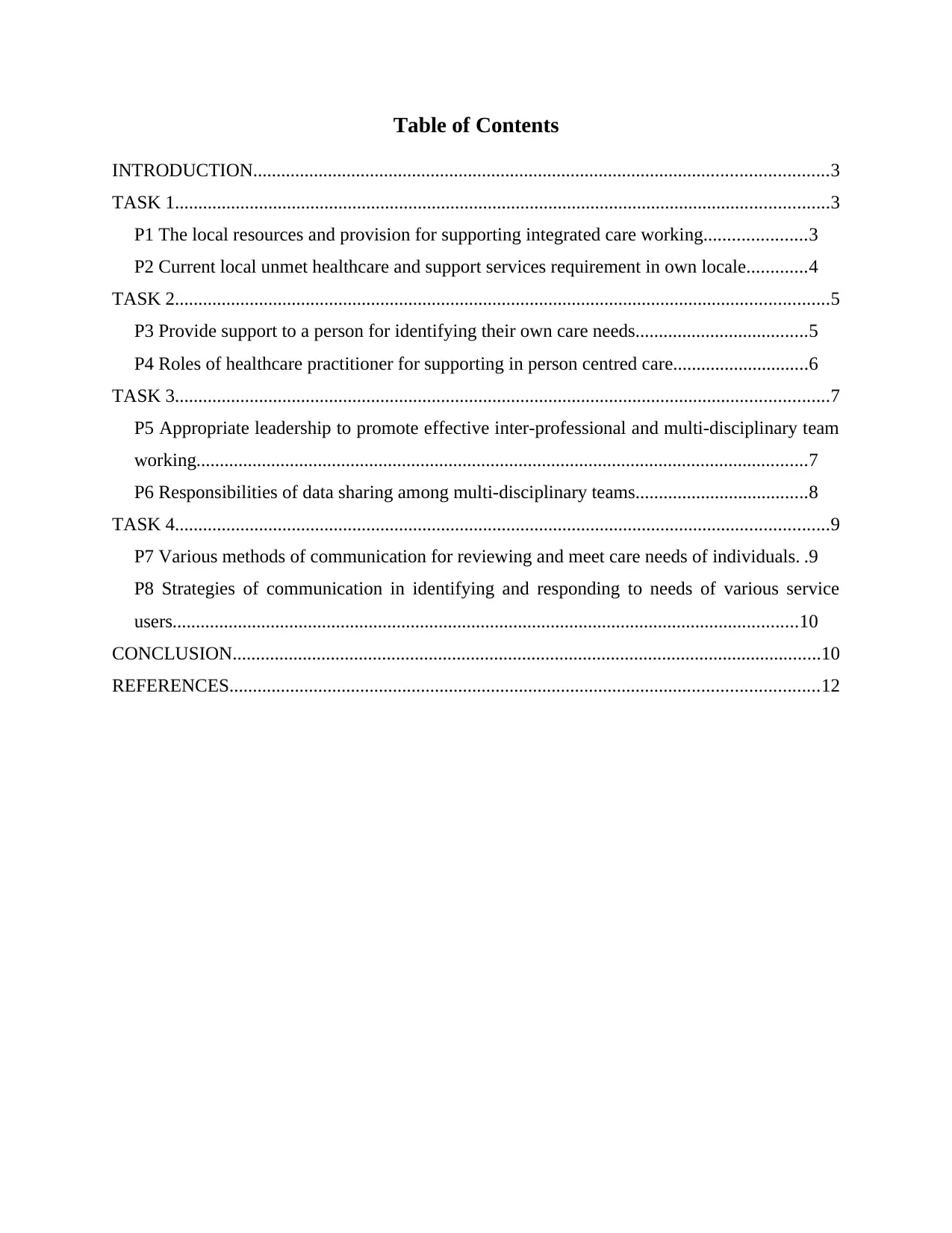
Table of Contents
INTRODUCTION...........................................................................................................................3
TASK 1............................................................................................................................................3
P1 The local resources and provision for supporting integrated care working......................3
P2 Current local unmet healthcare and support services requirement in own locale.............4
TASK 2............................................................................................................................................5
P3 Provide support to a person for identifying their own care needs.....................................5
P4 Roles of healthcare practitioner for supporting in person centred care.............................6
TASK 3............................................................................................................................................7
P5 Appropriate leadership to promote effective inter-professional and multi-disciplinary team
working...................................................................................................................................7
P6 Responsibilities of data sharing among multi-disciplinary teams.....................................8
TASK 4............................................................................................................................................9
P7 Various methods of communication for reviewing and meet care needs of individuals. .9
P8 Strategies of communication in identifying and responding to needs of various service
users......................................................................................................................................10
CONCLUSION..............................................................................................................................10
REFERENCES..............................................................................................................................12
INTRODUCTION...........................................................................................................................3
TASK 1............................................................................................................................................3
P1 The local resources and provision for supporting integrated care working......................3
P2 Current local unmet healthcare and support services requirement in own locale.............4
TASK 2............................................................................................................................................5
P3 Provide support to a person for identifying their own care needs.....................................5
P4 Roles of healthcare practitioner for supporting in person centred care.............................6
TASK 3............................................................................................................................................7
P5 Appropriate leadership to promote effective inter-professional and multi-disciplinary team
working...................................................................................................................................7
P6 Responsibilities of data sharing among multi-disciplinary teams.....................................8
TASK 4............................................................................................................................................9
P7 Various methods of communication for reviewing and meet care needs of individuals. .9
P8 Strategies of communication in identifying and responding to needs of various service
users......................................................................................................................................10
CONCLUSION..............................................................................................................................10
REFERENCES..............................................................................................................................12
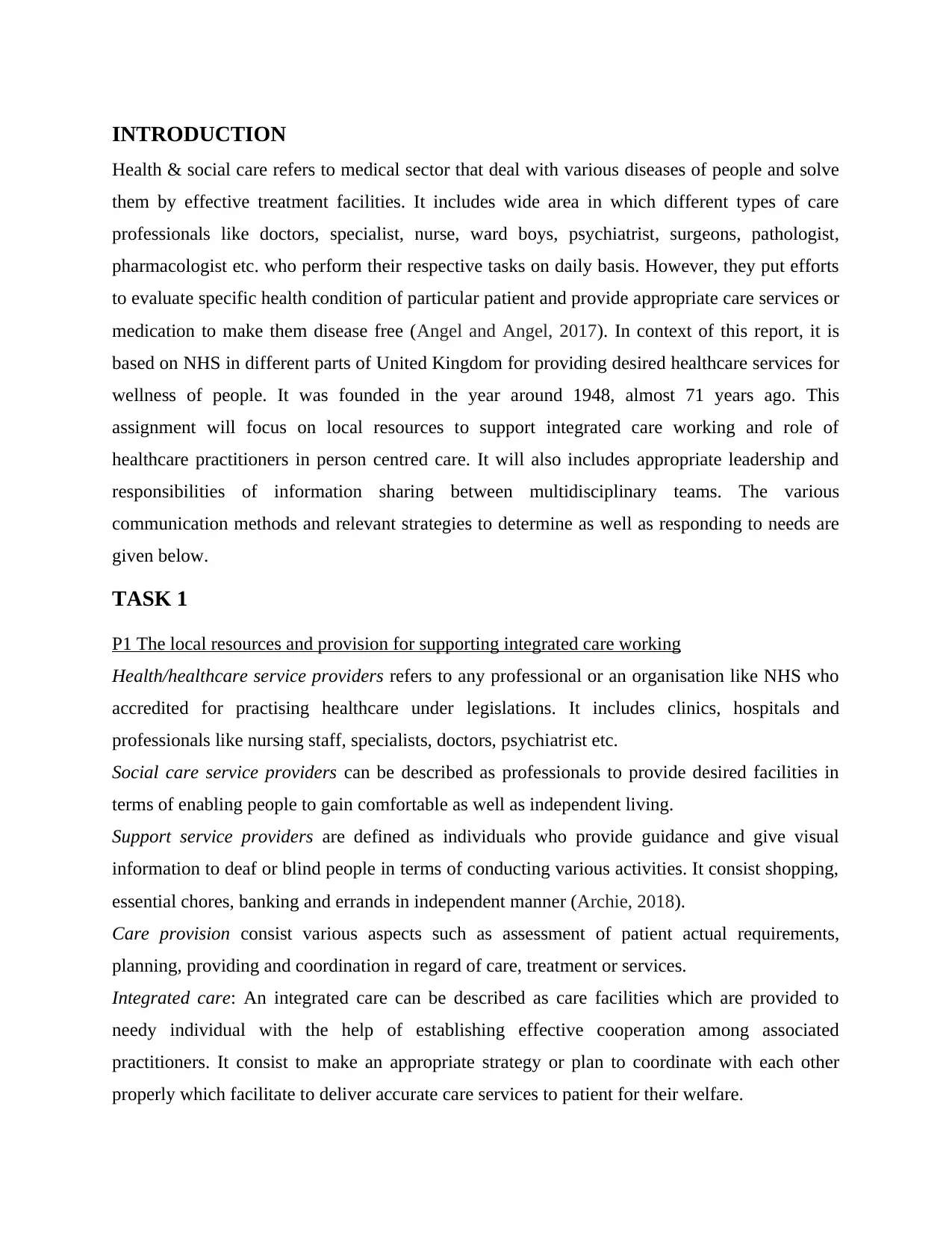
INTRODUCTION
Health & social care refers to medical sector that deal with various diseases of people and solve
them by effective treatment facilities. It includes wide area in which different types of care
professionals like doctors, specialist, nurse, ward boys, psychiatrist, surgeons, pathologist,
pharmacologist etc. who perform their respective tasks on daily basis. However, they put efforts
to evaluate specific health condition of particular patient and provide appropriate care services or
medication to make them disease free (Angel and Angel, 2017). In context of this report, it is
based on NHS in different parts of United Kingdom for providing desired healthcare services for
wellness of people. It was founded in the year around 1948, almost 71 years ago. This
assignment will focus on local resources to support integrated care working and role of
healthcare practitioners in person centred care. It will also includes appropriate leadership and
responsibilities of information sharing between multidisciplinary teams. The various
communication methods and relevant strategies to determine as well as responding to needs are
given below.
TASK 1
P1 The local resources and provision for supporting integrated care working
Health/healthcare service providers refers to any professional or an organisation like NHS who
accredited for practising healthcare under legislations. It includes clinics, hospitals and
professionals like nursing staff, specialists, doctors, psychiatrist etc.
Social care service providers can be described as professionals to provide desired facilities in
terms of enabling people to gain comfortable as well as independent living.
Support service providers are defined as individuals who provide guidance and give visual
information to deaf or blind people in terms of conducting various activities. It consist shopping,
essential chores, banking and errands in independent manner (Archie, 2018).
Care provision consist various aspects such as assessment of patient actual requirements,
planning, providing and coordination in regard of care, treatment or services.
Integrated care: An integrated care can be described as care facilities which are provided to
needy individual with the help of establishing effective cooperation among associated
practitioners. It consist to make an appropriate strategy or plan to coordinate with each other
properly which facilitate to deliver accurate care services to patient for their welfare.
Health & social care refers to medical sector that deal with various diseases of people and solve
them by effective treatment facilities. It includes wide area in which different types of care
professionals like doctors, specialist, nurse, ward boys, psychiatrist, surgeons, pathologist,
pharmacologist etc. who perform their respective tasks on daily basis. However, they put efforts
to evaluate specific health condition of particular patient and provide appropriate care services or
medication to make them disease free (Angel and Angel, 2017). In context of this report, it is
based on NHS in different parts of United Kingdom for providing desired healthcare services for
wellness of people. It was founded in the year around 1948, almost 71 years ago. This
assignment will focus on local resources to support integrated care working and role of
healthcare practitioners in person centred care. It will also includes appropriate leadership and
responsibilities of information sharing between multidisciplinary teams. The various
communication methods and relevant strategies to determine as well as responding to needs are
given below.
TASK 1
P1 The local resources and provision for supporting integrated care working
Health/healthcare service providers refers to any professional or an organisation like NHS who
accredited for practising healthcare under legislations. It includes clinics, hospitals and
professionals like nursing staff, specialists, doctors, psychiatrist etc.
Social care service providers can be described as professionals to provide desired facilities in
terms of enabling people to gain comfortable as well as independent living.
Support service providers are defined as individuals who provide guidance and give visual
information to deaf or blind people in terms of conducting various activities. It consist shopping,
essential chores, banking and errands in independent manner (Archie, 2018).
Care provision consist various aspects such as assessment of patient actual requirements,
planning, providing and coordination in regard of care, treatment or services.
Integrated care: An integrated care can be described as care facilities which are provided to
needy individual with the help of establishing effective cooperation among associated
practitioners. It consist to make an appropriate strategy or plan to coordinate with each other
properly which facilitate to deliver accurate care services to patient for their welfare.
⊘ This is a preview!⊘
Do you want full access?
Subscribe today to unlock all pages.

Trusted by 1+ million students worldwide
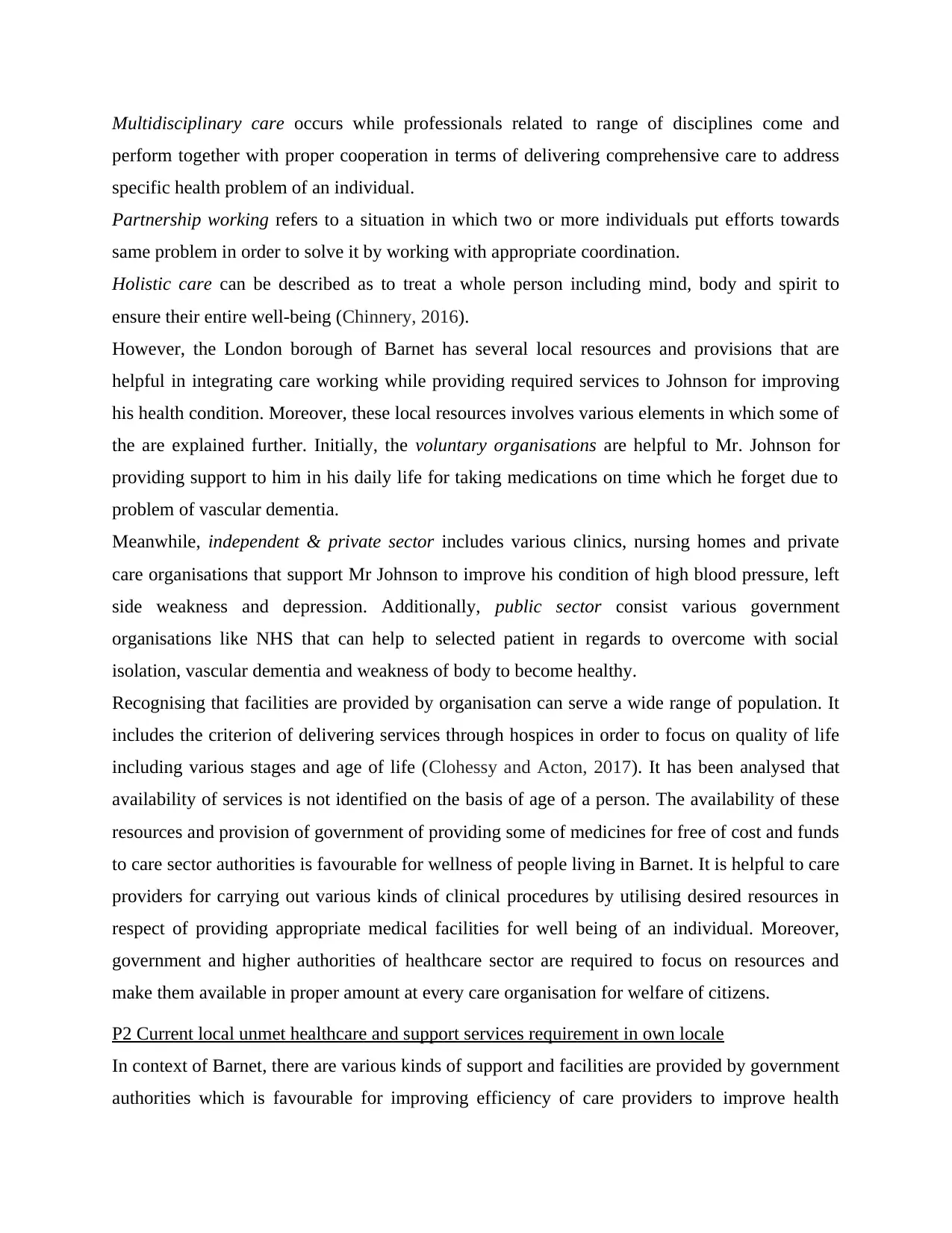
Multidisciplinary care occurs while professionals related to range of disciplines come and
perform together with proper cooperation in terms of delivering comprehensive care to address
specific health problem of an individual.
Partnership working refers to a situation in which two or more individuals put efforts towards
same problem in order to solve it by working with appropriate coordination.
Holistic care can be described as to treat a whole person including mind, body and spirit to
ensure their entire well-being (Chinnery, 2016).
However, the London borough of Barnet has several local resources and provisions that are
helpful in integrating care working while providing required services to Johnson for improving
his health condition. Moreover, these local resources involves various elements in which some of
the are explained further. Initially, the voluntary organisations are helpful to Mr. Johnson for
providing support to him in his daily life for taking medications on time which he forget due to
problem of vascular dementia.
Meanwhile, independent & private sector includes various clinics, nursing homes and private
care organisations that support Mr Johnson to improve his condition of high blood pressure, left
side weakness and depression. Additionally, public sector consist various government
organisations like NHS that can help to selected patient in regards to overcome with social
isolation, vascular dementia and weakness of body to become healthy.
Recognising that facilities are provided by organisation can serve a wide range of population. It
includes the criterion of delivering services through hospices in order to focus on quality of life
including various stages and age of life (Clohessy and Acton, 2017). It has been analysed that
availability of services is not identified on the basis of age of a person. The availability of these
resources and provision of government of providing some of medicines for free of cost and funds
to care sector authorities is favourable for wellness of people living in Barnet. It is helpful to care
providers for carrying out various kinds of clinical procedures by utilising desired resources in
respect of providing appropriate medical facilities for well being of an individual. Moreover,
government and higher authorities of healthcare sector are required to focus on resources and
make them available in proper amount at every care organisation for welfare of citizens.
P2 Current local unmet healthcare and support services requirement in own locale
In context of Barnet, there are various kinds of support and facilities are provided by government
authorities which is favourable for improving efficiency of care providers to improve health
perform together with proper cooperation in terms of delivering comprehensive care to address
specific health problem of an individual.
Partnership working refers to a situation in which two or more individuals put efforts towards
same problem in order to solve it by working with appropriate coordination.
Holistic care can be described as to treat a whole person including mind, body and spirit to
ensure their entire well-being (Chinnery, 2016).
However, the London borough of Barnet has several local resources and provisions that are
helpful in integrating care working while providing required services to Johnson for improving
his health condition. Moreover, these local resources involves various elements in which some of
the are explained further. Initially, the voluntary organisations are helpful to Mr. Johnson for
providing support to him in his daily life for taking medications on time which he forget due to
problem of vascular dementia.
Meanwhile, independent & private sector includes various clinics, nursing homes and private
care organisations that support Mr Johnson to improve his condition of high blood pressure, left
side weakness and depression. Additionally, public sector consist various government
organisations like NHS that can help to selected patient in regards to overcome with social
isolation, vascular dementia and weakness of body to become healthy.
Recognising that facilities are provided by organisation can serve a wide range of population. It
includes the criterion of delivering services through hospices in order to focus on quality of life
including various stages and age of life (Clohessy and Acton, 2017). It has been analysed that
availability of services is not identified on the basis of age of a person. The availability of these
resources and provision of government of providing some of medicines for free of cost and funds
to care sector authorities is favourable for wellness of people living in Barnet. It is helpful to care
providers for carrying out various kinds of clinical procedures by utilising desired resources in
respect of providing appropriate medical facilities for well being of an individual. Moreover,
government and higher authorities of healthcare sector are required to focus on resources and
make them available in proper amount at every care organisation for welfare of citizens.
P2 Current local unmet healthcare and support services requirement in own locale
In context of Barnet, there are various kinds of support and facilities are provided by government
authorities which is favourable for improving efficiency of care providers to improve health
Paraphrase This Document
Need a fresh take? Get an instant paraphrase of this document with our AI Paraphraser
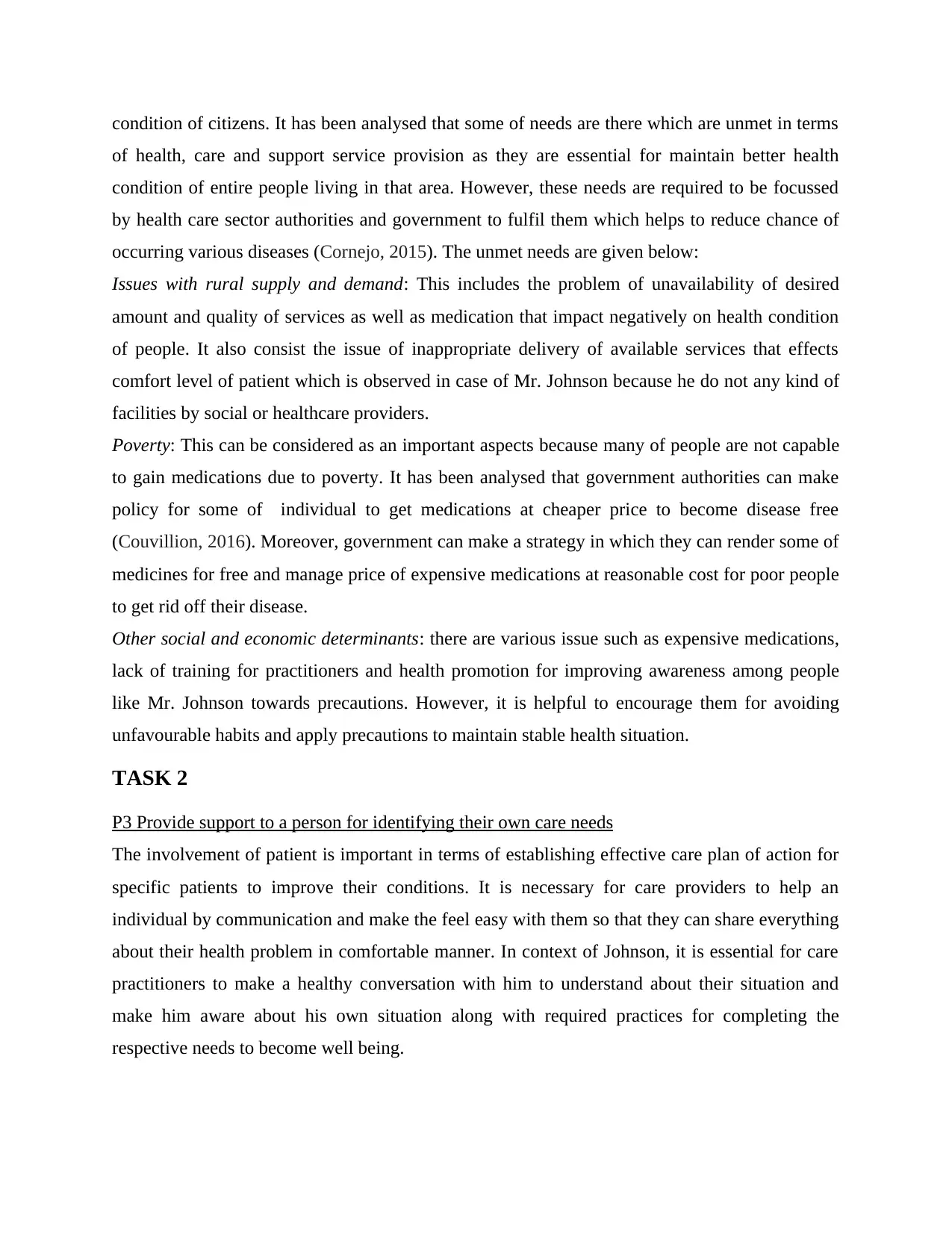
condition of citizens. It has been analysed that some of needs are there which are unmet in terms
of health, care and support service provision as they are essential for maintain better health
condition of entire people living in that area. However, these needs are required to be focussed
by health care sector authorities and government to fulfil them which helps to reduce chance of
occurring various diseases (Cornejo, 2015). The unmet needs are given below:
Issues with rural supply and demand: This includes the problem of unavailability of desired
amount and quality of services as well as medication that impact negatively on health condition
of people. It also consist the issue of inappropriate delivery of available services that effects
comfort level of patient which is observed in case of Mr. Johnson because he do not any kind of
facilities by social or healthcare providers.
Poverty: This can be considered as an important aspects because many of people are not capable
to gain medications due to poverty. It has been analysed that government authorities can make
policy for some of individual to get medications at cheaper price to become disease free
(Couvillion, 2016). Moreover, government can make a strategy in which they can render some of
medicines for free and manage price of expensive medications at reasonable cost for poor people
to get rid off their disease.
Other social and economic determinants: there are various issue such as expensive medications,
lack of training for practitioners and health promotion for improving awareness among people
like Mr. Johnson towards precautions. However, it is helpful to encourage them for avoiding
unfavourable habits and apply precautions to maintain stable health situation.
TASK 2
P3 Provide support to a person for identifying their own care needs
The involvement of patient is important in terms of establishing effective care plan of action for
specific patients to improve their conditions. It is necessary for care providers to help an
individual by communication and make the feel easy with them so that they can share everything
about their health problem in comfortable manner. In context of Johnson, it is essential for care
practitioners to make a healthy conversation with him to understand about their situation and
make him aware about his own situation along with required practices for completing the
respective needs to become well being.
of health, care and support service provision as they are essential for maintain better health
condition of entire people living in that area. However, these needs are required to be focussed
by health care sector authorities and government to fulfil them which helps to reduce chance of
occurring various diseases (Cornejo, 2015). The unmet needs are given below:
Issues with rural supply and demand: This includes the problem of unavailability of desired
amount and quality of services as well as medication that impact negatively on health condition
of people. It also consist the issue of inappropriate delivery of available services that effects
comfort level of patient which is observed in case of Mr. Johnson because he do not any kind of
facilities by social or healthcare providers.
Poverty: This can be considered as an important aspects because many of people are not capable
to gain medications due to poverty. It has been analysed that government authorities can make
policy for some of individual to get medications at cheaper price to become disease free
(Couvillion, 2016). Moreover, government can make a strategy in which they can render some of
medicines for free and manage price of expensive medications at reasonable cost for poor people
to get rid off their disease.
Other social and economic determinants: there are various issue such as expensive medications,
lack of training for practitioners and health promotion for improving awareness among people
like Mr. Johnson towards precautions. However, it is helpful to encourage them for avoiding
unfavourable habits and apply precautions to maintain stable health situation.
TASK 2
P3 Provide support to a person for identifying their own care needs
The involvement of patient is important in terms of establishing effective care plan of action for
specific patients to improve their conditions. It is necessary for care providers to help an
individual by communication and make the feel easy with them so that they can share everything
about their health problem in comfortable manner. In context of Johnson, it is essential for care
practitioners to make a healthy conversation with him to understand about their situation and
make him aware about his own situation along with required practices for completing the
respective needs to become well being.
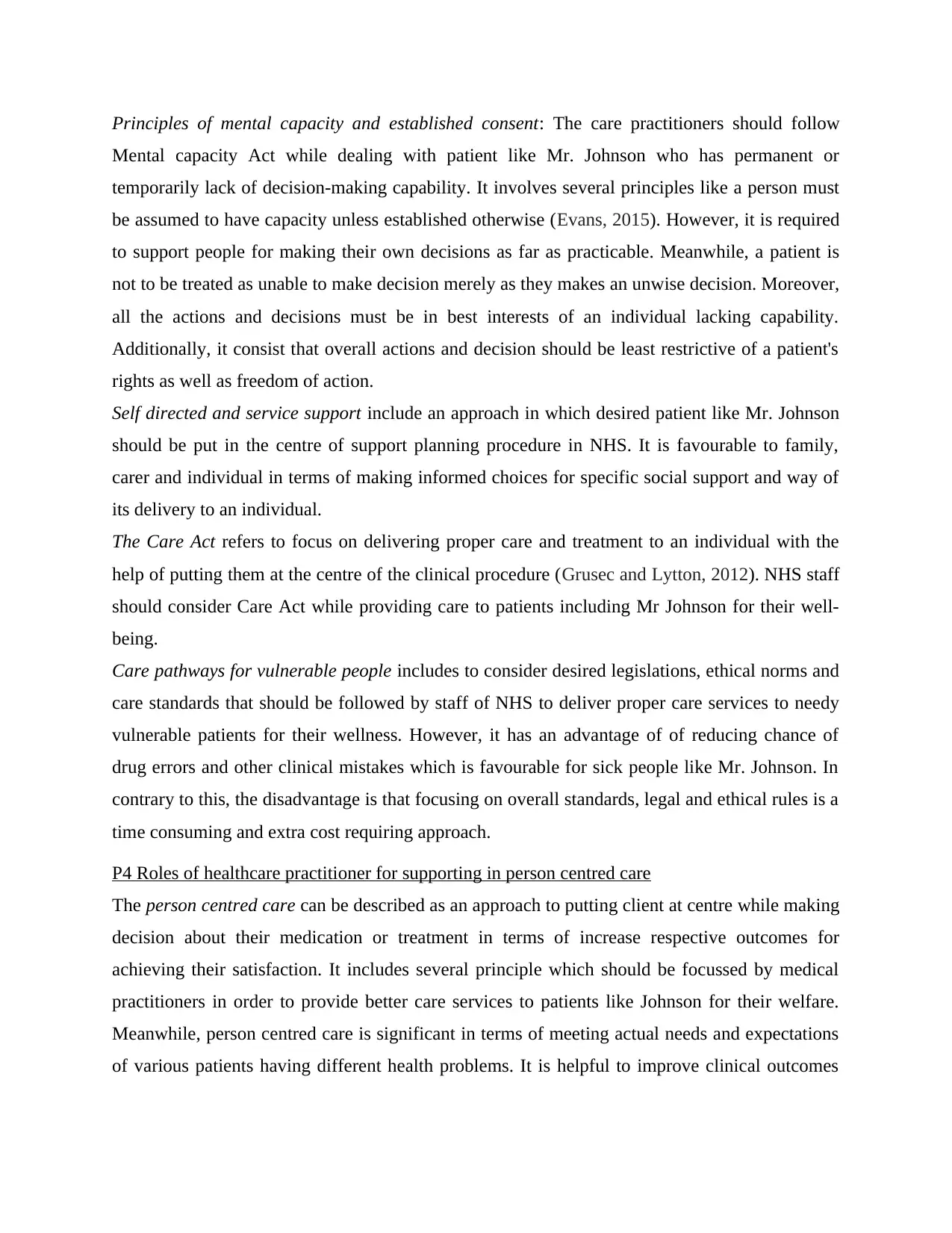
Principles of mental capacity and established consent: The care practitioners should follow
Mental capacity Act while dealing with patient like Mr. Johnson who has permanent or
temporarily lack of decision-making capability. It involves several principles like a person must
be assumed to have capacity unless established otherwise (Evans, 2015). However, it is required
to support people for making their own decisions as far as practicable. Meanwhile, a patient is
not to be treated as unable to make decision merely as they makes an unwise decision. Moreover,
all the actions and decisions must be in best interests of an individual lacking capability.
Additionally, it consist that overall actions and decision should be least restrictive of a patient's
rights as well as freedom of action.
Self directed and service support include an approach in which desired patient like Mr. Johnson
should be put in the centre of support planning procedure in NHS. It is favourable to family,
carer and individual in terms of making informed choices for specific social support and way of
its delivery to an individual.
The Care Act refers to focus on delivering proper care and treatment to an individual with the
help of putting them at the centre of the clinical procedure (Grusec and Lytton, 2012). NHS staff
should consider Care Act while providing care to patients including Mr Johnson for their well-
being.
Care pathways for vulnerable people includes to consider desired legislations, ethical norms and
care standards that should be followed by staff of NHS to deliver proper care services to needy
vulnerable patients for their wellness. However, it has an advantage of of reducing chance of
drug errors and other clinical mistakes which is favourable for sick people like Mr. Johnson. In
contrary to this, the disadvantage is that focusing on overall standards, legal and ethical rules is a
time consuming and extra cost requiring approach.
P4 Roles of healthcare practitioner for supporting in person centred care
The person centred care can be described as an approach to putting client at centre while making
decision about their medication or treatment in terms of increase respective outcomes for
achieving their satisfaction. It includes several principle which should be focussed by medical
practitioners in order to provide better care services to patients like Johnson for their welfare.
Meanwhile, person centred care is significant in terms of meeting actual needs and expectations
of various patients having different health problems. It is helpful to improve clinical outcomes
Mental capacity Act while dealing with patient like Mr. Johnson who has permanent or
temporarily lack of decision-making capability. It involves several principles like a person must
be assumed to have capacity unless established otherwise (Evans, 2015). However, it is required
to support people for making their own decisions as far as practicable. Meanwhile, a patient is
not to be treated as unable to make decision merely as they makes an unwise decision. Moreover,
all the actions and decisions must be in best interests of an individual lacking capability.
Additionally, it consist that overall actions and decision should be least restrictive of a patient's
rights as well as freedom of action.
Self directed and service support include an approach in which desired patient like Mr. Johnson
should be put in the centre of support planning procedure in NHS. It is favourable to family,
carer and individual in terms of making informed choices for specific social support and way of
its delivery to an individual.
The Care Act refers to focus on delivering proper care and treatment to an individual with the
help of putting them at the centre of the clinical procedure (Grusec and Lytton, 2012). NHS staff
should consider Care Act while providing care to patients including Mr Johnson for their well-
being.
Care pathways for vulnerable people includes to consider desired legislations, ethical norms and
care standards that should be followed by staff of NHS to deliver proper care services to needy
vulnerable patients for their wellness. However, it has an advantage of of reducing chance of
drug errors and other clinical mistakes which is favourable for sick people like Mr. Johnson. In
contrary to this, the disadvantage is that focusing on overall standards, legal and ethical rules is a
time consuming and extra cost requiring approach.
P4 Roles of healthcare practitioner for supporting in person centred care
The person centred care can be described as an approach to putting client at centre while making
decision about their medication or treatment in terms of increase respective outcomes for
achieving their satisfaction. It includes several principle which should be focussed by medical
practitioners in order to provide better care services to patients like Johnson for their welfare.
Meanwhile, person centred care is significant in terms of meeting actual needs and expectations
of various patients having different health problems. It is helpful to improve clinical outcomes
⊘ This is a preview!⊘
Do you want full access?
Subscribe today to unlock all pages.

Trusted by 1+ million students worldwide
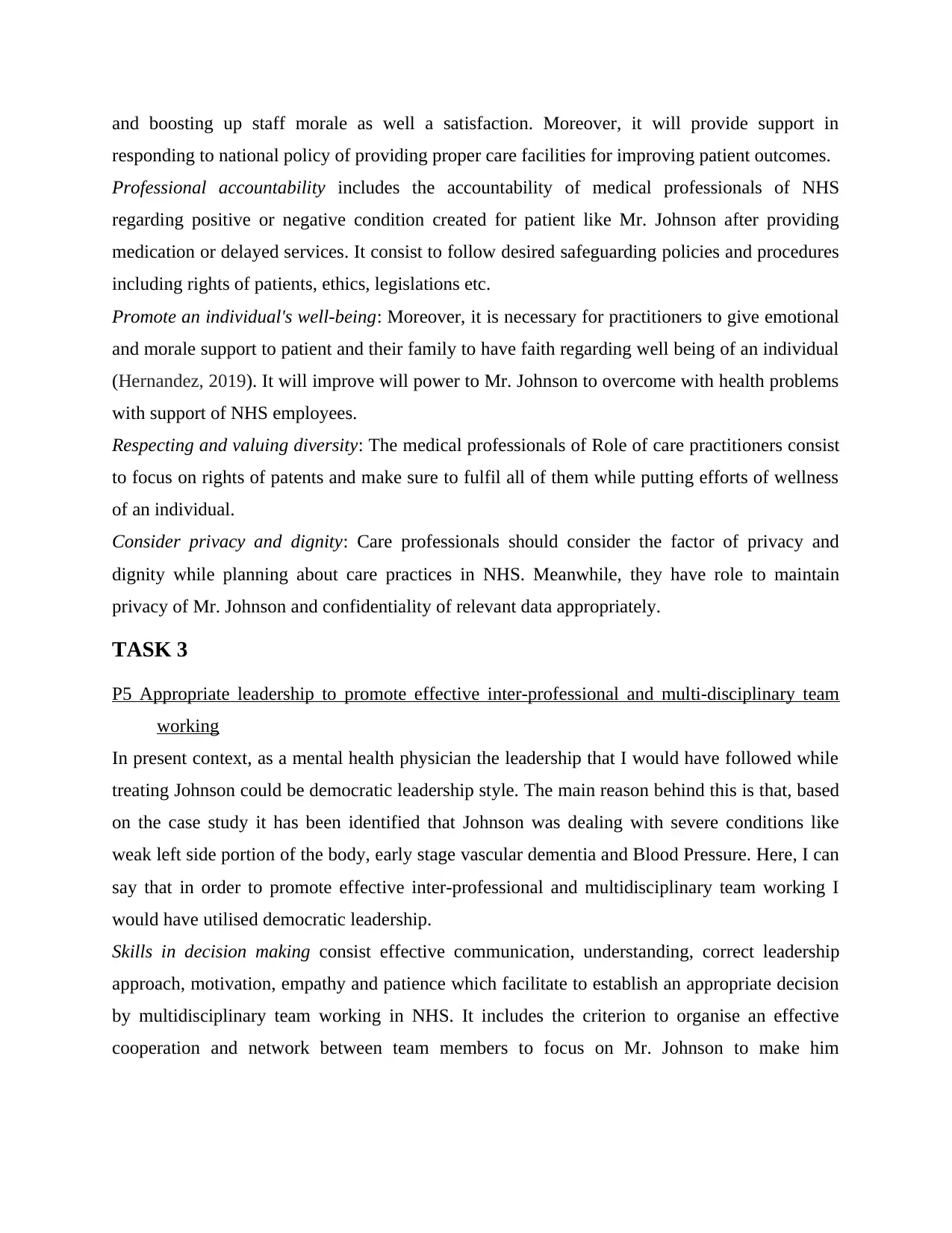
and boosting up staff morale as well a satisfaction. Moreover, it will provide support in
responding to national policy of providing proper care facilities for improving patient outcomes.
Professional accountability includes the accountability of medical professionals of NHS
regarding positive or negative condition created for patient like Mr. Johnson after providing
medication or delayed services. It consist to follow desired safeguarding policies and procedures
including rights of patients, ethics, legislations etc.
Promote an individual's well-being: Moreover, it is necessary for practitioners to give emotional
and morale support to patient and their family to have faith regarding well being of an individual
(Hernandez, 2019). It will improve will power to Mr. Johnson to overcome with health problems
with support of NHS employees.
Respecting and valuing diversity: The medical professionals of Role of care practitioners consist
to focus on rights of patents and make sure to fulfil all of them while putting efforts of wellness
of an individual.
Consider privacy and dignity: Care professionals should consider the factor of privacy and
dignity while planning about care practices in NHS. Meanwhile, they have role to maintain
privacy of Mr. Johnson and confidentiality of relevant data appropriately.
TASK 3
P5 Appropriate leadership to promote effective inter-professional and multi-disciplinary team
working
In present context, as a mental health physician the leadership that I would have followed while
treating Johnson could be democratic leadership style. The main reason behind this is that, based
on the case study it has been identified that Johnson was dealing with severe conditions like
weak left side portion of the body, early stage vascular dementia and Blood Pressure. Here, I can
say that in order to promote effective inter-professional and multidisciplinary team working I
would have utilised democratic leadership.
Skills in decision making consist effective communication, understanding, correct leadership
approach, motivation, empathy and patience which facilitate to establish an appropriate decision
by multidisciplinary team working in NHS. It includes the criterion to organise an effective
cooperation and network between team members to focus on Mr. Johnson to make him
responding to national policy of providing proper care facilities for improving patient outcomes.
Professional accountability includes the accountability of medical professionals of NHS
regarding positive or negative condition created for patient like Mr. Johnson after providing
medication or delayed services. It consist to follow desired safeguarding policies and procedures
including rights of patients, ethics, legislations etc.
Promote an individual's well-being: Moreover, it is necessary for practitioners to give emotional
and morale support to patient and their family to have faith regarding well being of an individual
(Hernandez, 2019). It will improve will power to Mr. Johnson to overcome with health problems
with support of NHS employees.
Respecting and valuing diversity: The medical professionals of Role of care practitioners consist
to focus on rights of patents and make sure to fulfil all of them while putting efforts of wellness
of an individual.
Consider privacy and dignity: Care professionals should consider the factor of privacy and
dignity while planning about care practices in NHS. Meanwhile, they have role to maintain
privacy of Mr. Johnson and confidentiality of relevant data appropriately.
TASK 3
P5 Appropriate leadership to promote effective inter-professional and multi-disciplinary team
working
In present context, as a mental health physician the leadership that I would have followed while
treating Johnson could be democratic leadership style. The main reason behind this is that, based
on the case study it has been identified that Johnson was dealing with severe conditions like
weak left side portion of the body, early stage vascular dementia and Blood Pressure. Here, I can
say that in order to promote effective inter-professional and multidisciplinary team working I
would have utilised democratic leadership.
Skills in decision making consist effective communication, understanding, correct leadership
approach, motivation, empathy and patience which facilitate to establish an appropriate decision
by multidisciplinary team working in NHS. It includes the criterion to organise an effective
cooperation and network between team members to focus on Mr. Johnson to make him
Paraphrase This Document
Need a fresh take? Get an instant paraphrase of this document with our AI Paraphraser
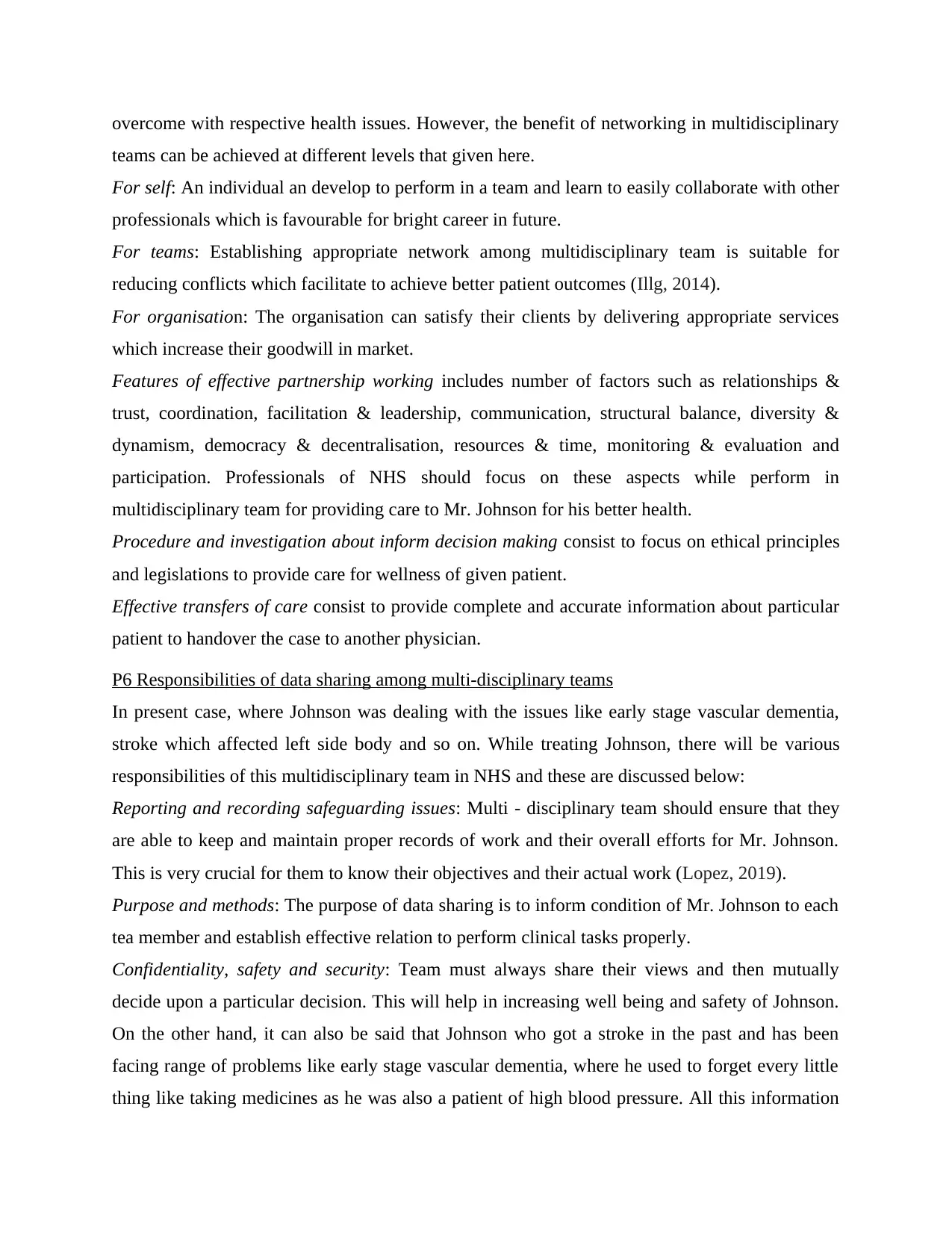
overcome with respective health issues. However, the benefit of networking in multidisciplinary
teams can be achieved at different levels that given here.
For self: An individual an develop to perform in a team and learn to easily collaborate with other
professionals which is favourable for bright career in future.
For teams: Establishing appropriate network among multidisciplinary team is suitable for
reducing conflicts which facilitate to achieve better patient outcomes (Illg, 2014).
For organisation: The organisation can satisfy their clients by delivering appropriate services
which increase their goodwill in market.
Features of effective partnership working includes number of factors such as relationships &
trust, coordination, facilitation & leadership, communication, structural balance, diversity &
dynamism, democracy & decentralisation, resources & time, monitoring & evaluation and
participation. Professionals of NHS should focus on these aspects while perform in
multidisciplinary team for providing care to Mr. Johnson for his better health.
Procedure and investigation about inform decision making consist to focus on ethical principles
and legislations to provide care for wellness of given patient.
Effective transfers of care consist to provide complete and accurate information about particular
patient to handover the case to another physician.
P6 Responsibilities of data sharing among multi-disciplinary teams
In present case, where Johnson was dealing with the issues like early stage vascular dementia,
stroke which affected left side body and so on. While treating Johnson, there will be various
responsibilities of this multidisciplinary team in NHS and these are discussed below:
Reporting and recording safeguarding issues: Multi - disciplinary team should ensure that they
are able to keep and maintain proper records of work and their overall efforts for Mr. Johnson.
This is very crucial for them to know their objectives and their actual work (Lopez, 2019).
Purpose and methods: The purpose of data sharing is to inform condition of Mr. Johnson to each
tea member and establish effective relation to perform clinical tasks properly.
Confidentiality, safety and security: Team must always share their views and then mutually
decide upon a particular decision. This will help in increasing well being and safety of Johnson.
On the other hand, it can also be said that Johnson who got a stroke in the past and has been
facing range of problems like early stage vascular dementia, where he used to forget every little
thing like taking medicines as he was also a patient of high blood pressure. All this information
teams can be achieved at different levels that given here.
For self: An individual an develop to perform in a team and learn to easily collaborate with other
professionals which is favourable for bright career in future.
For teams: Establishing appropriate network among multidisciplinary team is suitable for
reducing conflicts which facilitate to achieve better patient outcomes (Illg, 2014).
For organisation: The organisation can satisfy their clients by delivering appropriate services
which increase their goodwill in market.
Features of effective partnership working includes number of factors such as relationships &
trust, coordination, facilitation & leadership, communication, structural balance, diversity &
dynamism, democracy & decentralisation, resources & time, monitoring & evaluation and
participation. Professionals of NHS should focus on these aspects while perform in
multidisciplinary team for providing care to Mr. Johnson for his better health.
Procedure and investigation about inform decision making consist to focus on ethical principles
and legislations to provide care for wellness of given patient.
Effective transfers of care consist to provide complete and accurate information about particular
patient to handover the case to another physician.
P6 Responsibilities of data sharing among multi-disciplinary teams
In present case, where Johnson was dealing with the issues like early stage vascular dementia,
stroke which affected left side body and so on. While treating Johnson, there will be various
responsibilities of this multidisciplinary team in NHS and these are discussed below:
Reporting and recording safeguarding issues: Multi - disciplinary team should ensure that they
are able to keep and maintain proper records of work and their overall efforts for Mr. Johnson.
This is very crucial for them to know their objectives and their actual work (Lopez, 2019).
Purpose and methods: The purpose of data sharing is to inform condition of Mr. Johnson to each
tea member and establish effective relation to perform clinical tasks properly.
Confidentiality, safety and security: Team must always share their views and then mutually
decide upon a particular decision. This will help in increasing well being and safety of Johnson.
On the other hand, it can also be said that Johnson who got a stroke in the past and has been
facing range of problems like early stage vascular dementia, where he used to forget every little
thing like taking medicines as he was also a patient of high blood pressure. All this information
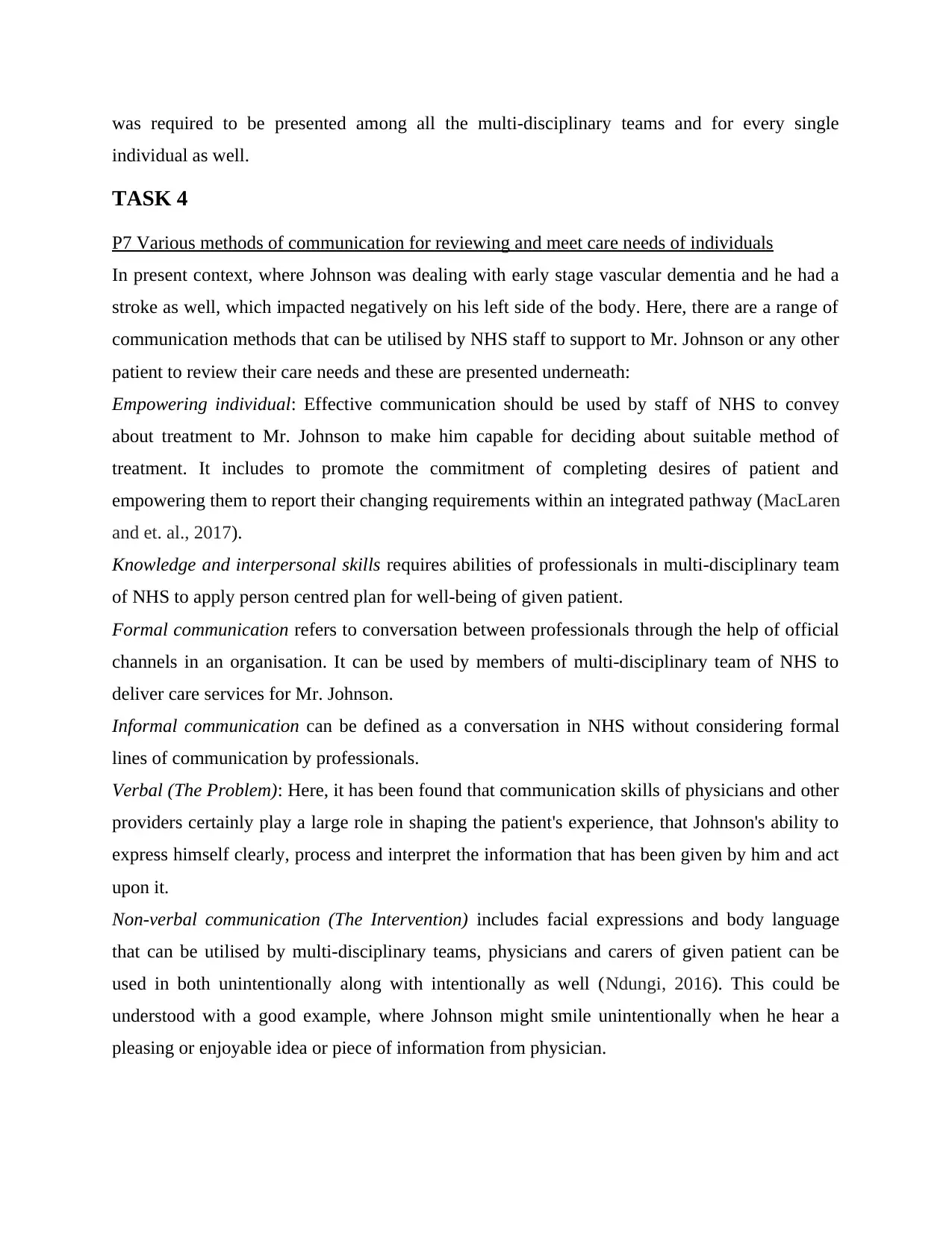
was required to be presented among all the multi-disciplinary teams and for every single
individual as well.
TASK 4
P7 Various methods of communication for reviewing and meet care needs of individuals
In present context, where Johnson was dealing with early stage vascular dementia and he had a
stroke as well, which impacted negatively on his left side of the body. Here, there are a range of
communication methods that can be utilised by NHS staff to support to Mr. Johnson or any other
patient to review their care needs and these are presented underneath:
Empowering individual: Effective communication should be used by staff of NHS to convey
about treatment to Mr. Johnson to make him capable for deciding about suitable method of
treatment. It includes to promote the commitment of completing desires of patient and
empowering them to report their changing requirements within an integrated pathway (MacLaren
and et. al., 2017).
Knowledge and interpersonal skills requires abilities of professionals in multi-disciplinary team
of NHS to apply person centred plan for well-being of given patient.
Formal communication refers to conversation between professionals through the help of official
channels in an organisation. It can be used by members of multi-disciplinary team of NHS to
deliver care services for Mr. Johnson.
Informal communication can be defined as a conversation in NHS without considering formal
lines of communication by professionals.
Verbal (The Problem): Here, it has been found that communication skills of physicians and other
providers certainly play a large role in shaping the patient's experience, that Johnson's ability to
express himself clearly, process and interpret the information that has been given by him and act
upon it.
Non-verbal communication (The Intervention) includes facial expressions and body language
that can be utilised by multi-disciplinary teams, physicians and carers of given patient can be
used in both unintentionally along with intentionally as well (Ndungi, 2016). This could be
understood with a good example, where Johnson might smile unintentionally when he hear a
pleasing or enjoyable idea or piece of information from physician.
individual as well.
TASK 4
P7 Various methods of communication for reviewing and meet care needs of individuals
In present context, where Johnson was dealing with early stage vascular dementia and he had a
stroke as well, which impacted negatively on his left side of the body. Here, there are a range of
communication methods that can be utilised by NHS staff to support to Mr. Johnson or any other
patient to review their care needs and these are presented underneath:
Empowering individual: Effective communication should be used by staff of NHS to convey
about treatment to Mr. Johnson to make him capable for deciding about suitable method of
treatment. It includes to promote the commitment of completing desires of patient and
empowering them to report their changing requirements within an integrated pathway (MacLaren
and et. al., 2017).
Knowledge and interpersonal skills requires abilities of professionals in multi-disciplinary team
of NHS to apply person centred plan for well-being of given patient.
Formal communication refers to conversation between professionals through the help of official
channels in an organisation. It can be used by members of multi-disciplinary team of NHS to
deliver care services for Mr. Johnson.
Informal communication can be defined as a conversation in NHS without considering formal
lines of communication by professionals.
Verbal (The Problem): Here, it has been found that communication skills of physicians and other
providers certainly play a large role in shaping the patient's experience, that Johnson's ability to
express himself clearly, process and interpret the information that has been given by him and act
upon it.
Non-verbal communication (The Intervention) includes facial expressions and body language
that can be utilised by multi-disciplinary teams, physicians and carers of given patient can be
used in both unintentionally along with intentionally as well (Ndungi, 2016). This could be
understood with a good example, where Johnson might smile unintentionally when he hear a
pleasing or enjoyable idea or piece of information from physician.
⊘ This is a preview!⊘
Do you want full access?
Subscribe today to unlock all pages.

Trusted by 1+ million students worldwide
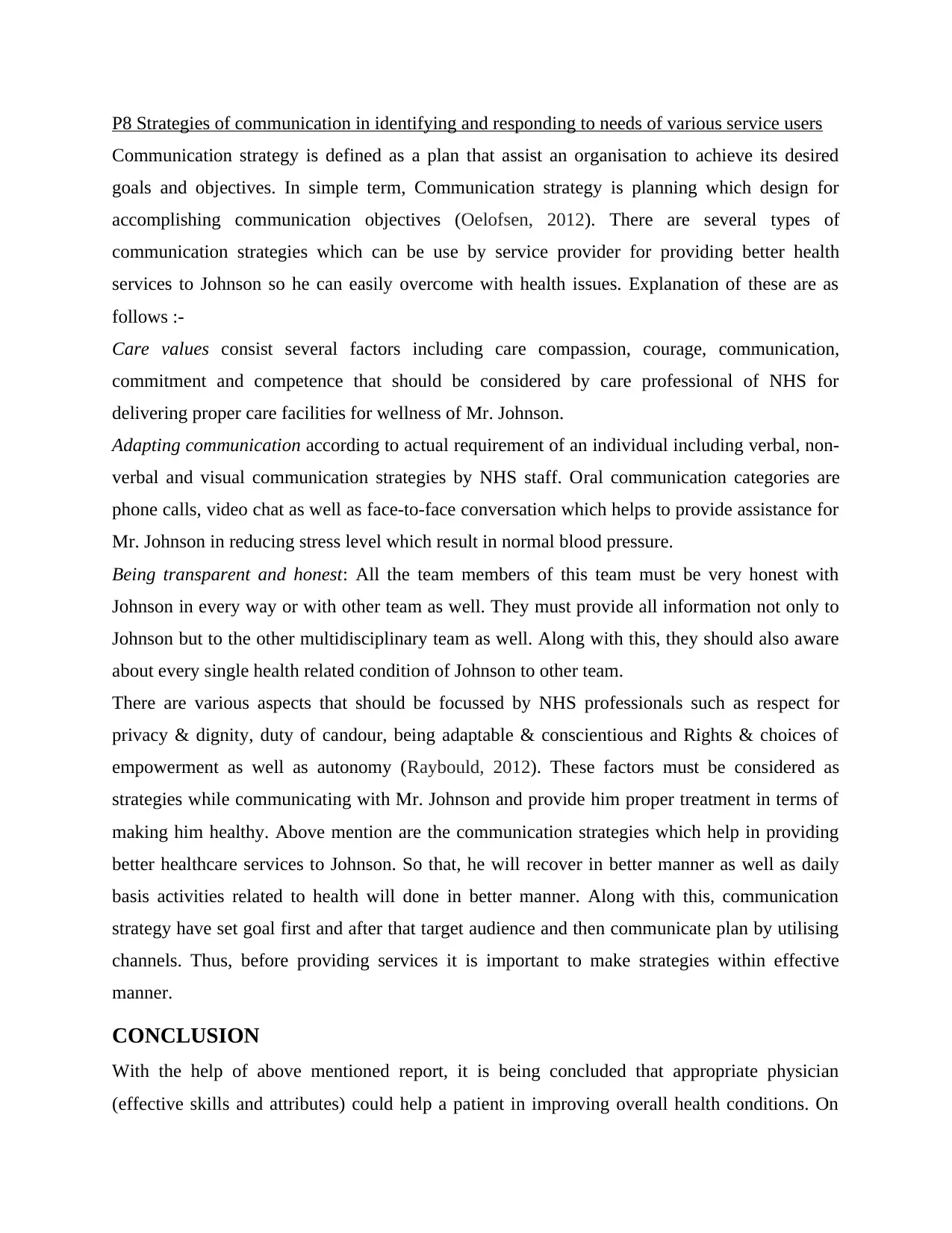
P8 Strategies of communication in identifying and responding to needs of various service users
Communication strategy is defined as a plan that assist an organisation to achieve its desired
goals and objectives. In simple term, Communication strategy is planning which design for
accomplishing communication objectives (Oelofsen, 2012). There are several types of
communication strategies which can be use by service provider for providing better health
services to Johnson so he can easily overcome with health issues. Explanation of these are as
follows :-
Care values consist several factors including care compassion, courage, communication,
commitment and competence that should be considered by care professional of NHS for
delivering proper care facilities for wellness of Mr. Johnson.
Adapting communication according to actual requirement of an individual including verbal, non-
verbal and visual communication strategies by NHS staff. Oral communication categories are
phone calls, video chat as well as face-to-face conversation which helps to provide assistance for
Mr. Johnson in reducing stress level which result in normal blood pressure.
Being transparent and honest: All the team members of this team must be very honest with
Johnson in every way or with other team as well. They must provide all information not only to
Johnson but to the other multidisciplinary team as well. Along with this, they should also aware
about every single health related condition of Johnson to other team.
There are various aspects that should be focussed by NHS professionals such as respect for
privacy & dignity, duty of candour, being adaptable & conscientious and Rights & choices of
empowerment as well as autonomy (Raybould, 2012). These factors must be considered as
strategies while communicating with Mr. Johnson and provide him proper treatment in terms of
making him healthy. Above mention are the communication strategies which help in providing
better healthcare services to Johnson. So that, he will recover in better manner as well as daily
basis activities related to health will done in better manner. Along with this, communication
strategy have set goal first and after that target audience and then communicate plan by utilising
channels. Thus, before providing services it is important to make strategies within effective
manner.
CONCLUSION
With the help of above mentioned report, it is being concluded that appropriate physician
(effective skills and attributes) could help a patient in improving overall health conditions. On
Communication strategy is defined as a plan that assist an organisation to achieve its desired
goals and objectives. In simple term, Communication strategy is planning which design for
accomplishing communication objectives (Oelofsen, 2012). There are several types of
communication strategies which can be use by service provider for providing better health
services to Johnson so he can easily overcome with health issues. Explanation of these are as
follows :-
Care values consist several factors including care compassion, courage, communication,
commitment and competence that should be considered by care professional of NHS for
delivering proper care facilities for wellness of Mr. Johnson.
Adapting communication according to actual requirement of an individual including verbal, non-
verbal and visual communication strategies by NHS staff. Oral communication categories are
phone calls, video chat as well as face-to-face conversation which helps to provide assistance for
Mr. Johnson in reducing stress level which result in normal blood pressure.
Being transparent and honest: All the team members of this team must be very honest with
Johnson in every way or with other team as well. They must provide all information not only to
Johnson but to the other multidisciplinary team as well. Along with this, they should also aware
about every single health related condition of Johnson to other team.
There are various aspects that should be focussed by NHS professionals such as respect for
privacy & dignity, duty of candour, being adaptable & conscientious and Rights & choices of
empowerment as well as autonomy (Raybould, 2012). These factors must be considered as
strategies while communicating with Mr. Johnson and provide him proper treatment in terms of
making him healthy. Above mention are the communication strategies which help in providing
better healthcare services to Johnson. So that, he will recover in better manner as well as daily
basis activities related to health will done in better manner. Along with this, communication
strategy have set goal first and after that target audience and then communicate plan by utilising
channels. Thus, before providing services it is important to make strategies within effective
manner.
CONCLUSION
With the help of above mentioned report, it is being concluded that appropriate physician
(effective skills and attributes) could help a patient in improving overall health conditions. On
Paraphrase This Document
Need a fresh take? Get an instant paraphrase of this document with our AI Paraphraser
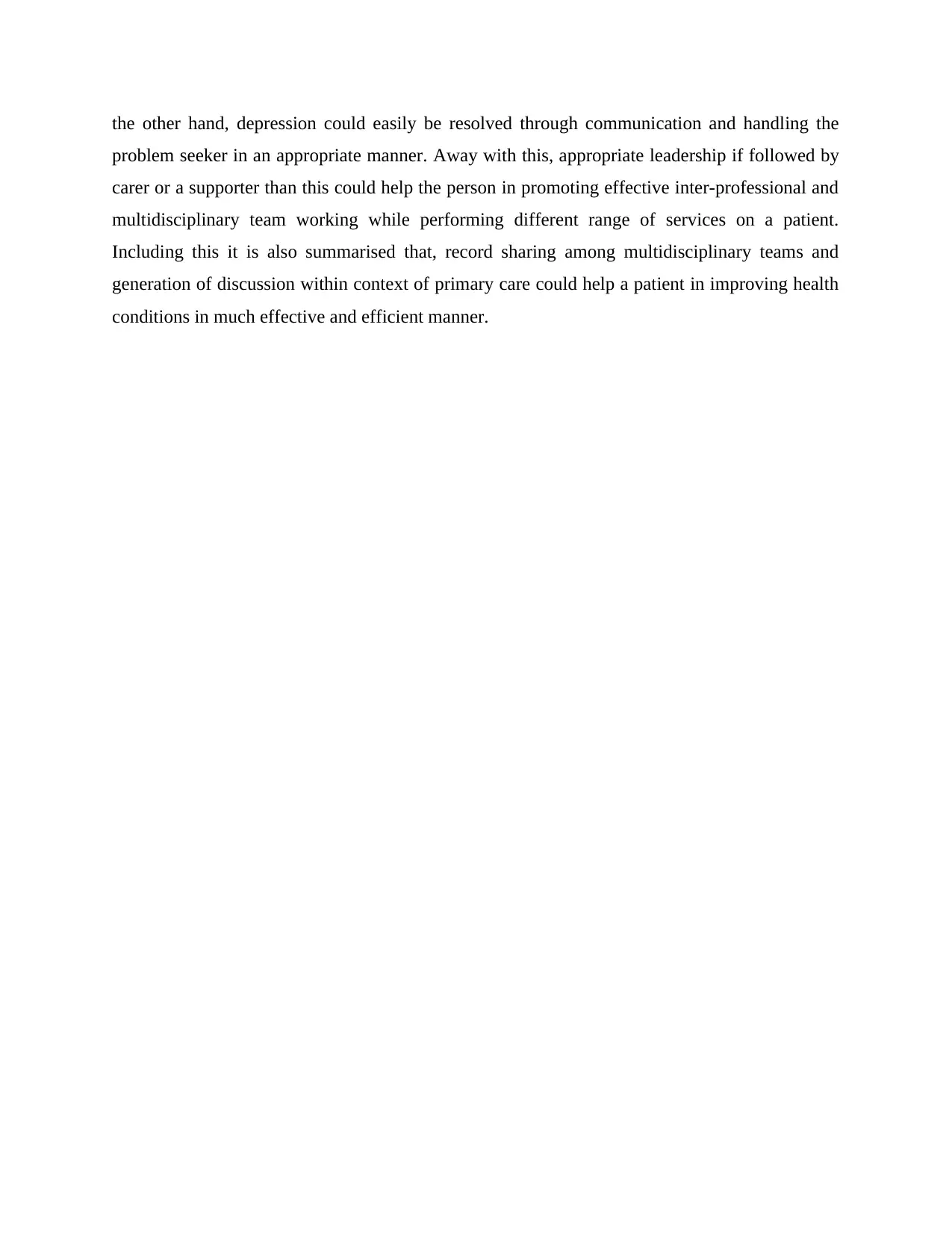
the other hand, depression could easily be resolved through communication and handling the
problem seeker in an appropriate manner. Away with this, appropriate leadership if followed by
carer or a supporter than this could help the person in promoting effective inter-professional and
multidisciplinary team working while performing different range of services on a patient.
Including this it is also summarised that, record sharing among multidisciplinary teams and
generation of discussion within context of primary care could help a patient in improving health
conditions in much effective and efficient manner.
problem seeker in an appropriate manner. Away with this, appropriate leadership if followed by
carer or a supporter than this could help the person in promoting effective inter-professional and
multidisciplinary team working while performing different range of services on a patient.
Including this it is also summarised that, record sharing among multidisciplinary teams and
generation of discussion within context of primary care could help a patient in improving health
conditions in much effective and efficient manner.
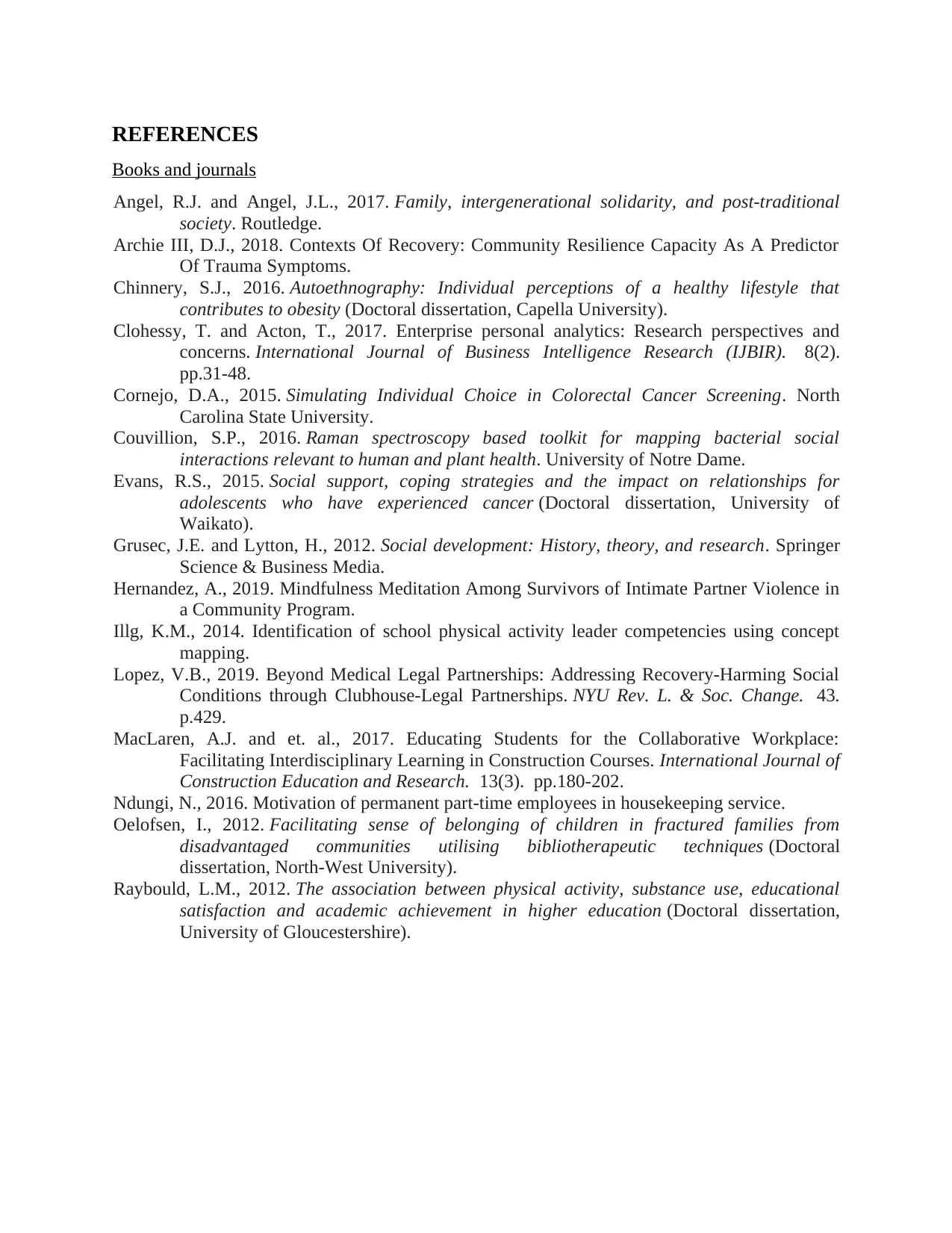
REFERENCES
Books and journals
Angel, R.J. and Angel, J.L., 2017. Family, intergenerational solidarity, and post-traditional
society. Routledge.
Archie III, D.J., 2018. Contexts Of Recovery: Community Resilience Capacity As A Predictor
Of Trauma Symptoms.
Chinnery, S.J., 2016. Autoethnography: Individual perceptions of a healthy lifestyle that
contributes to obesity (Doctoral dissertation, Capella University).
Clohessy, T. and Acton, T., 2017. Enterprise personal analytics: Research perspectives and
concerns. International Journal of Business Intelligence Research (IJBIR). 8(2).
pp.31-48.
Cornejo, D.A., 2015. Simulating Individual Choice in Colorectal Cancer Screening. North
Carolina State University.
Couvillion, S.P., 2016. Raman spectroscopy based toolkit for mapping bacterial social
interactions relevant to human and plant health. University of Notre Dame.
Evans, R.S., 2015. Social support, coping strategies and the impact on relationships for
adolescents who have experienced cancer (Doctoral dissertation, University of
Waikato).
Grusec, J.E. and Lytton, H., 2012. Social development: History, theory, and research. Springer
Science & Business Media.
Hernandez, A., 2019. Mindfulness Meditation Among Survivors of Intimate Partner Violence in
a Community Program.
Illg, K.M., 2014. Identification of school physical activity leader competencies using concept
mapping.
Lopez, V.B., 2019. Beyond Medical Legal Partnerships: Addressing Recovery-Harming Social
Conditions through Clubhouse-Legal Partnerships. NYU Rev. L. & Soc. Change. 43.
p.429.
MacLaren, A.J. and et. al., 2017. Educating Students for the Collaborative Workplace:
Facilitating Interdisciplinary Learning in Construction Courses. International Journal of
Construction Education and Research. 13(3). pp.180-202.
Ndungi, N., 2016. Motivation of permanent part-time employees in housekeeping service.
Oelofsen, I., 2012. Facilitating sense of belonging of children in fractured families from
disadvantaged communities utilising bibliotherapeutic techniques (Doctoral
dissertation, North-West University).
Raybould, L.M., 2012. The association between physical activity, substance use, educational
satisfaction and academic achievement in higher education (Doctoral dissertation,
University of Gloucestershire).
Books and journals
Angel, R.J. and Angel, J.L., 2017. Family, intergenerational solidarity, and post-traditional
society. Routledge.
Archie III, D.J., 2018. Contexts Of Recovery: Community Resilience Capacity As A Predictor
Of Trauma Symptoms.
Chinnery, S.J., 2016. Autoethnography: Individual perceptions of a healthy lifestyle that
contributes to obesity (Doctoral dissertation, Capella University).
Clohessy, T. and Acton, T., 2017. Enterprise personal analytics: Research perspectives and
concerns. International Journal of Business Intelligence Research (IJBIR). 8(2).
pp.31-48.
Cornejo, D.A., 2015. Simulating Individual Choice in Colorectal Cancer Screening. North
Carolina State University.
Couvillion, S.P., 2016. Raman spectroscopy based toolkit for mapping bacterial social
interactions relevant to human and plant health. University of Notre Dame.
Evans, R.S., 2015. Social support, coping strategies and the impact on relationships for
adolescents who have experienced cancer (Doctoral dissertation, University of
Waikato).
Grusec, J.E. and Lytton, H., 2012. Social development: History, theory, and research. Springer
Science & Business Media.
Hernandez, A., 2019. Mindfulness Meditation Among Survivors of Intimate Partner Violence in
a Community Program.
Illg, K.M., 2014. Identification of school physical activity leader competencies using concept
mapping.
Lopez, V.B., 2019. Beyond Medical Legal Partnerships: Addressing Recovery-Harming Social
Conditions through Clubhouse-Legal Partnerships. NYU Rev. L. & Soc. Change. 43.
p.429.
MacLaren, A.J. and et. al., 2017. Educating Students for the Collaborative Workplace:
Facilitating Interdisciplinary Learning in Construction Courses. International Journal of
Construction Education and Research. 13(3). pp.180-202.
Ndungi, N., 2016. Motivation of permanent part-time employees in housekeeping service.
Oelofsen, I., 2012. Facilitating sense of belonging of children in fractured families from
disadvantaged communities utilising bibliotherapeutic techniques (Doctoral
dissertation, North-West University).
Raybould, L.M., 2012. The association between physical activity, substance use, educational
satisfaction and academic achievement in higher education (Doctoral dissertation,
University of Gloucestershire).
⊘ This is a preview!⊘
Do you want full access?
Subscribe today to unlock all pages.

Trusted by 1+ million students worldwide
1 out of 12
Related Documents
Your All-in-One AI-Powered Toolkit for Academic Success.
+13062052269
info@desklib.com
Available 24*7 on WhatsApp / Email
![[object Object]](/_next/static/media/star-bottom.7253800d.svg)
Unlock your academic potential
Copyright © 2020–2026 A2Z Services. All Rights Reserved. Developed and managed by ZUCOL.





